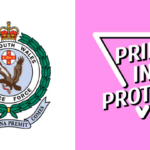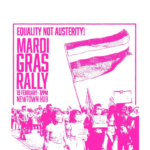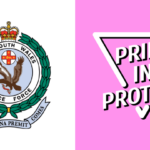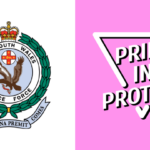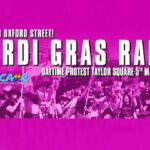Pride in Protest Lead Candidate Luna Choo on Keeping Mardi Gras Honest
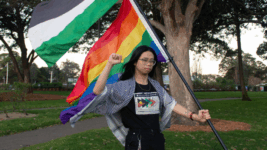
“Pride in Protest stands with the Palestinian people and their resistance, including the BDS movement. Shamefully, Mardi Gras is partnering with the company Fuzzy, which is investing in Israeli settlements in the West Bank and the Gaza genocide,” said Pride in Protest lead candidate for the Mardi Gras board this year Luna Choo.
“We will not sponsor bombs, bullets, the border wall or the blockade of Gaza,” Choo told the Saturday crowd gathered on Gadigal land in Sydney’s Belmore Park in mid-September to rally against rising racism and fascism in the Australian public sphere. Indeed, white nationalism has become increasingly pronounced over the second half of 2025, with this being a counterrally.
The Sydney Gay and Lesbian Mardi Gras Annual General Meeting will take place on Saturday 29 November 2025. The vote for the Mardi Gras board will take place with PiP running four candidates out a total of nine vying for the four available seats. This further includes four individuals for Protect Mardi Gras, along with one Liberal candidate.
The Mardi Gras AGM also involves voting on motions for policy and position changes. Pride in Protest is notorious for bringing demands to the table that often spark controversy. This year the left-wing social justice group will be raising motions in regard to cutting ties with companies complicit in the Gaza genocide, progressing antidiscrimination reform and the issue of cops out of Mardi Gras.
Pride was a riot
Pride in Protest caused a stir at the 2018 AGM, which was the first meet the group attended after its formation, with its stated aim of bringing back the radical roots of the long-term protest event, as the first Mardi Gras, the 1978 march, was an unauthorised demonstration by LGBTIQA+ people calling for the end of the criminalisation of their lives and to be able to openly express their sexualities.
Homosexuality was a criminal offence in NSW until 1984. The NSW Police Force brutally attacked the marchers in the 1978 demonstration for queer liberation. The Sydney Morning Herald then officially outed these people by detailing who they were in its publication, which, back then, could prove detrimental for individuals exposed.
But despite the resistance to the group at the 2018 AGM, Pride in Protest has continued to make further progressive and radical demands, including the key demand of ‘Cops out of Mardi Gras’, and over this time, general opinion at Mardi Gras AGMs and amongst civil society in general, has, on the whole, tended to shift towards the group’s reformatory agenda.
Sydney Criminal Lawyers spoke to Pride in Protest lead candidate Luna Choo about the issue with the company Fuzzy, which has won tender to hold the Bondi Beach Party, along with the reasons why the progression of antidiscrimination law is on the agenda this year, as well as how the issue of cops in the parade is shaping up for the 2026 march.
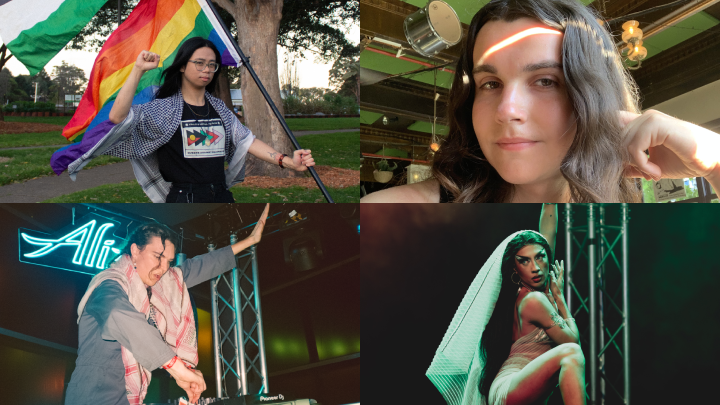
Luna, you’re running as the lead candidate for Pride and Protest in the election for the Mardi Gras board at the upcoming Sydney Gay and Lesbian Mardi Gras Annual General Meeting.
Can you tell us a bit about yourself and why you are running on the PiP ticket for the board this year?
My name is Luna Choo. My pronouns are she/they. I am a proud Malaysian trans girl and a queer asylum seeker. I am a local activist in Pride and Protest and the USYD Queer Action Collective. I am an organiser for trans justice, refugee rights and the liberation of Palestine.
So, I am running for the Mardi Gras board, representing queers fighting for a just world: one free of genocidal violence, police brutality and transphobia.
I have found the power of communities, of parties and of being on the streets. With the queer community, I have campaigned for the passing of the Equality Bill in full. I’ve publicly spoken out about the detention of other trans refugees, and I have organised queer contingents to pro-Palestine protests.
So, for the last Mardi Gras, the University of Sydney threatened to suspend and deport me for writing pro-Palestine messages on a whiteboard.
With the support of the union movement, other pro-Palestinian activists and Asian migrants, the queer community forced the university to retreat.
These were the same queers who I have stood with and will always stand with. We fight for our equal rights and the liberation of queer Palestinians and trans youth everywhere, be that on the street or on the Mardi Gras board.
In March, festival producer Fuzzy beat the Sydney Mardi Gras to win tender to host the festival’s Bondi Beach Party. In August, Mardi Gras went on to announce it would be outsourcing the running of a number of its events.
But this company Fuzzy having won the fight to put on the Bondi Beach Party for the next five years is problematic as far as PiP is concerned. Can you talk about why that is the case?
Fuzzy is a company that is a subsidiary of Superstruct Entertainment and another company KKR, which is an investment company.
KKR has stakes in everything from weapons companies to Israeli settlements in occupied Palestine, which makes it complicit in the Palestinian genocide and ethnic cleansing in the West Bank.
At the same time, you have KKR investing in the Coastal GasLink pipeline in Canada, which is on the tradition territory of the Wetʼsuwetʼen Nation. This means they are complicit in the Canadian crisis that is missing and murdered Indigenous women and girls.
The reason we are opposing all this is that we support the Palestinian people and the Wetʼsuwetʼen people.
Queers are being killed in Gaza and disappeared on First Nations land, via funding that comes via Fuzzy and KKR.
We oppose the pinkwashing of genocide, such that a party cannot be a celebration of any fun if it compromises conscience.
Another issue for PiP at the upcoming AGM is antidiscrimination law. Can you talk about why this is on the agenda this year?
Right now, there is this dangerous escalation of transphobic violence. Two weeks ago, the Northern Territory government declared a ban on trans women being housed in women’s prisons.
Nationally, the NT has become the first jurisdiction to announce a ban on trans women in women’s prisons, but the chief minister has urged all jurisdictions to declare similar bans.
Under Albanese, the federal Labor government has not committed to urgent reform of antidiscrimination laws.
They say they will not amend antidiscrimination law without support from the Liberals despite having an overwhelming majority themselves, and the Albanese Labor government has received recommendations from the Australian Law Reform Commission in favour of resolving antidiscrimination law reform, but they have not implemented the recommendations.
What this means is the NT government is rolling back equal rights for trans people and Sistergirls. This crisis is being driven by the federal government deferring and denying vital antidiscrimination law reform.
Albanese and others have to be held accountable to the communities that they claim to politically support, including Black trans women in detention.
Albanese says he is open to reforms that intend to protect queers. But we’re demanding the federal Labor government puts their money where their mouth is and be willing to support queer and trans rights for our communities, and until then, he should not march with us.

Alongside you, there are other candidates are running for Pride in Protest in the AGM election. Can you tell us a bit about them?
There are four of us on the Pride and Protest ticket. We are Luna Choo, Alyss Cachia, Miles Carter and Tala Ka.
So, Alyss Cachia is a proud trans woman and the queer officer for the University of NSW. The third candidate is Miles, who is a gender-nonconforming musician and an activist for trans women in immigration detention.
And last but certainly not least, Tala is a Filipino drag performer and activist in the City of Sydney for Palestine.
The four of us are members of the queer and trans community, and we are running for the Mardi Gras board and also fighting on the street for our collective liberation.
So, this means we collectively believe in cutting ties with genocide, ending police violence and demanding full equality for trans youth, sex workers and everyone without exception.
And lastly, Luna, Pride in Protest has been running candidates for the Mardi Gras board ever since its inception in 2018. A prominent issue for the group has always been ‘cops out of Mardi Gras’.
So, where are we at with that campaign at present? What are you expecting in terms of NSW police participation in next year’s event?
Where we are at with the police is there is an extreme culture of violence ingrained within the culture of the NSW police. Just yesterday, I was at the blockade of the Indo Pacific Expo. Many of us were pepper sprayed and brutalised by the police, which caused an activist to suffer a fractured bone.
What we are seeing is violent patterns within the police and they are pervasive. For example, in June, the NSW police assaulted and punched my fellow Malaysian activist Hannah Thomas in the face, which caused her to suffer a serious eye injury.
In July, Colin Burling, a 45-year-old gay man and a community member was violently restrained and killed in police custody fearing for his life.
These recent cases have also brought to light the antiqueer bigotry within the police. At queer rights and other protests, NSW police has made transphobic comments about people. They have called them homophobic slurs, misgendered them and it has discriminated against them in custody just last year.
The same police force has bashed queers, Black people, sex workers, before and after the first Mardi Gras. For example, at Mardi Gras 2013, they brutalised gay teenager Jamie Jackson Reed.
Two weeks ago, the same police also removed from Surry Hills police station a mural of Sydney’s queer history that included a banner that read, Stop Police Attacks on Gays, Women and Blacks.
That is where we are at with the NSW police, as it continues to brutalise queers, women and Black people and they also attempt to keep out of sight local communities demanding that police stop their attacks.
So, what Mardi Gras needs is a commitment to justice and a willingness to fight for justice for victims of police brutality.
What should be the discussion is how to hold these perpetrators of this police violence accountable to the communities that they abuse.
Whether this police participation is tolerable to Mardi Gras 2026 should not be the debate, because it must simply accept that it is beyond the pale to continue platforming our abuses.
What I expect and we actively campaign for is that Operation Mardi Gras be stopped as part of the demand to end police brutality.
What we want is to take Oxford Street from the NSW police and defend communities from their use of drug sniffer dogs and traumatic strip searches.
How we are going to get it is by fighting on the streets. We will be there for Trans Day of Resistance and other queer rights rallies and protests.



